-
 Bitcoin
Bitcoin $117,462.8204
-2.03% -
 Ethereum
Ethereum $3,061.1595
1.10% -
 XRP
XRP $2.9139
-2.19% -
 Tether USDt
Tether USDt $1.0002
0.02% -
 BNB
BNB $685.1357
-1.24% -
 Solana
Solana $161.3803
-2.11% -
 USDC
USDC $1.0002
0.04% -
 Dogecoin
Dogecoin $0.1948
-2.92% -
 TRON
TRON $0.2987
-0.89% -
 Cardano
Cardano $0.7330
-1.27% -
 Hyperliquid
Hyperliquid $47.7888
0.13% -
 Stellar
Stellar $0.4514
-2.93% -
 Sui
Sui $4.0169
2.74% -
 Chainlink
Chainlink $15.7088
-2.57% -
 Hedera
Hedera $0.2356
-3.33% -
 Bitcoin Cash
Bitcoin Cash $488.6656
-3.61% -
 Avalanche
Avalanche $21.2955
-1.47% -
 UNUS SED LEO
UNUS SED LEO $9.0415
0.42% -
 Shiba Inu
Shiba Inu $0.0...01332
-0.82% -
 Toncoin
Toncoin $3.0124
-0.62% -
 Litecoin
Litecoin $94.2175
-2.07% -
 Polkadot
Polkadot $4.0011
-0.61% -
 Monero
Monero $333.5714
-3.46% -
 Uniswap
Uniswap $9.1114
-1.56% -
 Dai
Dai $1.0000
0.02% -
 Ethena USDe
Ethena USDe $1.0005
0.00% -
 Bitget Token
Bitget Token $4.4951
1.87% -
 Pepe
Pepe $0.0...01242
0.47% -
 Aave
Aave $321.9943
0.51% -
 Bittensor
Bittensor $434.1984
5.13%
Will the Bitcoin ETF create a Bitcoin supply shock?
A Bitcoin ETF could boost demand by making it easier for mainstream investors to buy in, potentially creating a "quasi-supply shock" due to Bitcoin’s fixed supply.
Jul 13, 2025 at 10:37 pm
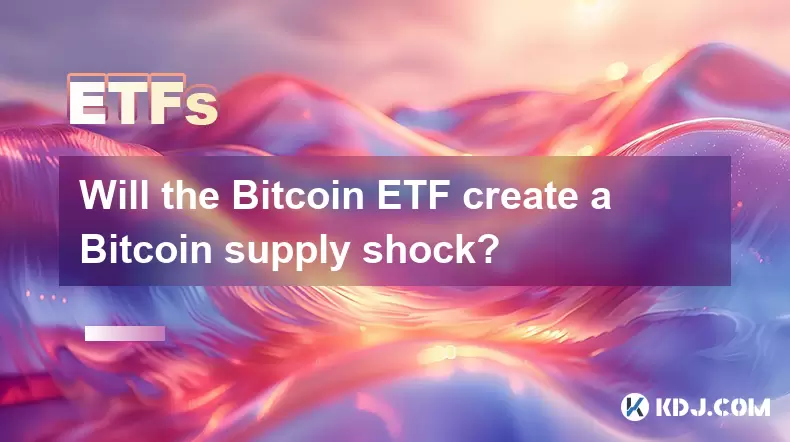
What Is a Bitcoin ETF?
A Bitcoin Exchange-Traded Fund (ETF) is an investment vehicle that tracks the price of Bitcoin without requiring investors to directly own the cryptocurrency. Instead, investors can buy shares in the ETF through traditional brokerage accounts, making it easier for institutional and retail investors to gain exposure to Bitcoin.
The potential approval of a Bitcoin ETF has been widely anticipated because it could significantly lower the barriers to entry for mainstream investors. Unlike purchasing Bitcoin directly on a crypto exchange, which involves managing private keys and navigating complex platforms, an ETF would allow users to invest in Bitcoin as they would any other stock or commodity fund.
This ease of access could lead to increased demand for Bitcoin, potentially affecting its supply dynamics.
Understanding Bitcoin Supply Mechanics
Bitcoin operates on a fixed supply model, with a maximum cap of 21 million coins. As of now, over 19 million Bitcoins have already been mined, leaving fewer than 2 million left to be gradually released through mining rewards approximately every four years during a halving event.
Each block mined on the Bitcoin blockchain currently yields 6.25 BTC as a reward, though this number will decrease by half again in 2024. This controlled issuance mechanism ensures scarcity over time, mimicking precious metals like gold.
Because no new Bitcoins can be created beyond the 21 million limit, any surge in demand must be met by existing holders willing to sell.
How Could a Bitcoin ETF Influence Demand?
If a Bitcoin ETF receives regulatory approval and begins trading, it would likely attract substantial inflows from both individual and institutional investors. The ETF structure provides a familiar, regulated, and liquid way to gain exposure to Bitcoin without dealing with custody, security, or exchange volatility issues.
Institutional adoption could accelerate dramatically, especially among pension funds, endowments, and mutual funds that are restricted from holding cryptocurrencies directly. The result would be a significant increase in demand for Bitcoin.
- Investors buying ETF shares would indirectly drive up the demand for underlying Bitcoin.
- ETF providers may need to purchase large quantities of Bitcoin to back their shares, further tightening available supply.
- Increased media attention and investor confidence could amplify speculative buying.
This surge in demand, if not matched by sufficient selling pressure, could create upward price pressure and reduce available liquidity.
Will This Lead to a Supply Shock?
A supply shock typically refers to a sudden reduction in the availability of a commodity or asset, often leading to sharp price increases. In the case of Bitcoin, the supply isn't shrinking — it's simply becoming increasingly scarce over time due to the capped issuance schedule.
However, a Bitcoin ETF could trigger what some call a "quasi-supply shock." If ETF-driven demand outpaces the rate at which new Bitcoin enters circulation, the market could experience intense competition for limited available coins.
- Miners sell only a small portion of newly minted Bitcoin each day.
- Long-term holders tend to accumulate rather than sell, especially during bull cycles.
- Institutional buying via ETFs could absorb available supply faster than it's being produced.
This imbalance between supply and demand could mimic the effects of a supply shock, even though no actual disruption in Bitcoin’s supply chain occurs.
Real-World Implications and Historical Precedents
Looking at historical precedents, such as the launch of gold ETFs in the early 2000s, we can draw parallels. When gold ETFs were introduced, they made it easier for investors to access gold without owning physical bars or coins. The result was a sustained increase in gold prices over several years.
Similarly, a Bitcoin ETF could catalyze a new wave of capital inflows into Bitcoin. The difference lies in Bitcoin's digital nature and its rigid supply schedule.
- Gold can be mined more intensively in response to higher prices.
- Bitcoin's issuance is algorithmically fixed and cannot be increased.
- Any ETF-induced demand spike would have to contend with Bitcoin's immutable supply rules.
This structural rigidity makes Bitcoin uniquely susceptible to demand-side pressures once widespread financial instruments like ETFs become available.
Frequently Asked Questions
Q: Can a Bitcoin ETF affect the mining industry?
A: While a Bitcoin ETF does not directly influence mining operations, increased demand driven by ETFs could raise Bitcoin's price, thereby increasing mining profitability and encouraging more mining activity.
Q: How does a Bitcoin ETF differ from a Bitcoin futures ETF?
A: A spot Bitcoin ETF holds actual Bitcoin as collateral for its shares, whereas a futures ETF uses Bitcoin futures contracts, which can introduce tracking errors and contango-related costs.
Q: Are there regulatory risks associated with a Bitcoin ETF?
A: Yes, regulatory scrutiny remains high. Concerns about manipulation, custody, and market integrity have delayed approvals in the past, particularly from the U.S. Securities and Exchange Commission (SEC).
Q: Could a Bitcoin ETF cause volatility in the crypto markets?
A: It could initially, especially during periods of high inflows or outflows. However, over time, ETFs tend to stabilize markets by providing additional liquidity and attracting long-term investors.
Disclaimer:info@kdj.com
The information provided is not trading advice. kdj.com does not assume any responsibility for any investments made based on the information provided in this article. Cryptocurrencies are highly volatile and it is highly recommended that you invest with caution after thorough research!
If you believe that the content used on this website infringes your copyright, please contact us immediately (info@kdj.com) and we will delete it promptly.
- Bitcoin, Altcoins, and DeFi: Navigating the Evolving Crypto Landscape
- 2025-07-16 05:30:12
- DeFi Demystified: Navigating the Wild West of Decentralized Finance
- 2025-07-16 04:50:12
- JPMorgan, Stablecoins, and Dimon: A Love-Hate Story?
- 2025-07-16 04:55:12
- Bitcoin's ATH Surge: Exchange Inflows and What They Mean for You, Ya Know?
- 2025-07-16 04:30:12
- PUMP Token Mania on Hyperliquid: Unit Tokenization Takes Center Stage
- 2025-07-16 05:35:12
- Altcoins Awakening: Ethereum's Surge and Bitcoin Dominance Shift
- 2025-07-16 05:50:12
Related knowledge
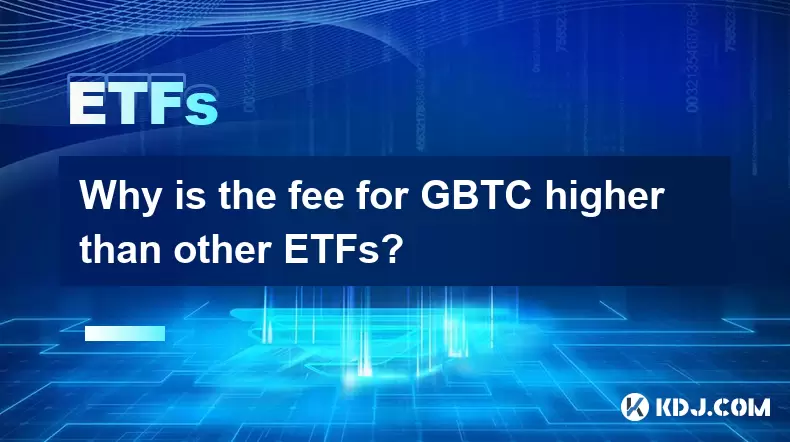
Why is the fee for GBTC higher than other ETFs?
Jul 15,2025 at 03:50pm
Understanding the Structure of GBTCThe Grayscale Bitcoin Trust (GBTC) is a unique investment vehicle that allows investors to gain exposure to Bitcoin...
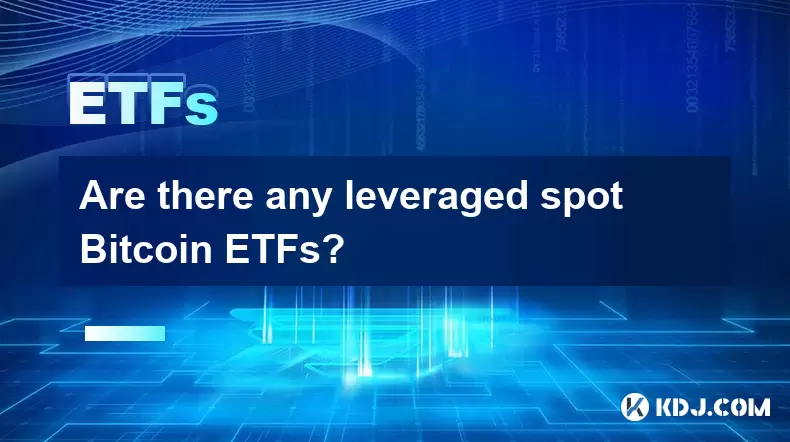
Are there any leveraged spot Bitcoin ETFs?
Jul 14,2025 at 02:22am
What is a Leveraged Spot Bitcoin ETF?A leveraged spot Bitcoin ETF refers to an exchange-traded fund that provides amplified exposure to the price move...
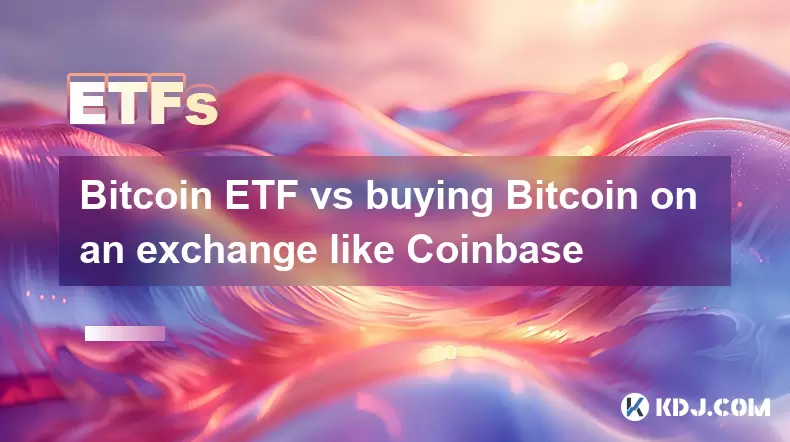
Bitcoin ETF vs buying Bitcoin on an exchange like Coinbase
Jul 09,2025 at 10:15am
What is a Bitcoin ETF?A Bitcoin ETF (Exchange-Traded Fund) is a financial product that tracks the price of Bitcoin without requiring investors to own ...
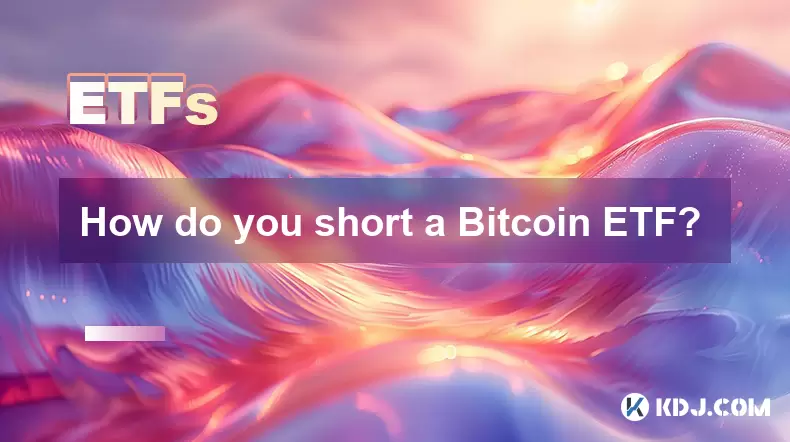
How do you short a Bitcoin ETF?
Jul 09,2025 at 06:14pm
Understanding the Basics of Shorting a Bitcoin ETFShorting a Bitcoin Exchange-Traded Fund (ETF) involves betting that the price of the ETF will fall. ...
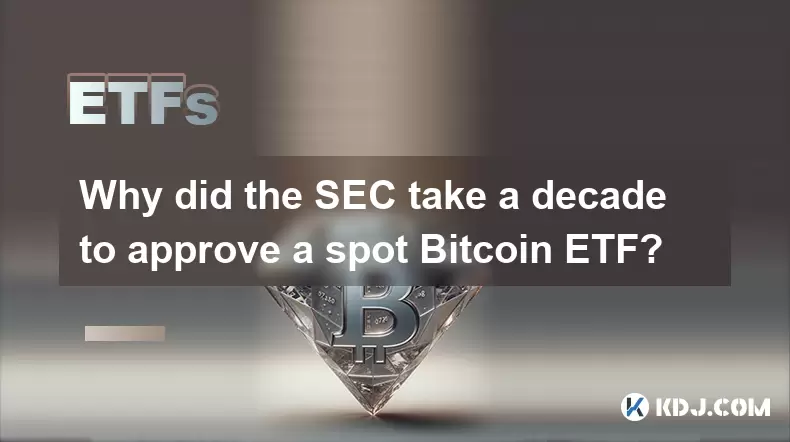
Why did the SEC take a decade to approve a spot Bitcoin ETF?
Jul 11,2025 at 06:07am
Regulatory Framework and Historical ContextThe Securities and Exchange Commission (SEC) has long maintained a cautious approach to financial instrumen...
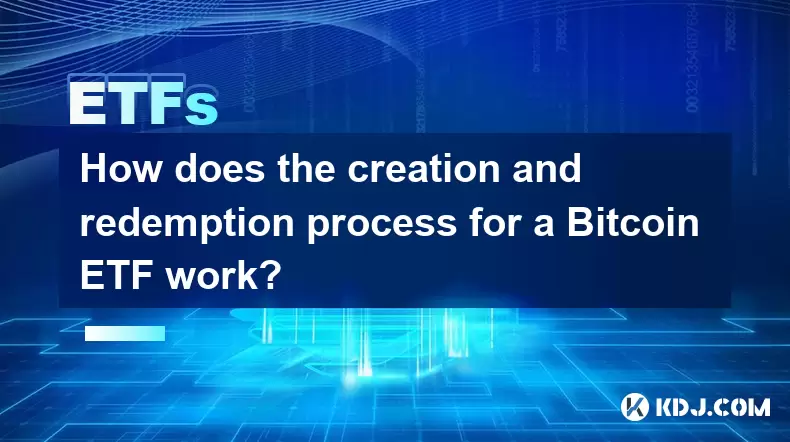
How does the creation and redemption process for a Bitcoin ETF work?
Jul 15,2025 at 07:00pm
What is a Bitcoin ETF?A Bitcoin Exchange-Traded Fund (ETF) is an investment vehicle that tracks the price of Bitcoin without requiring investors to di...

Why is the fee for GBTC higher than other ETFs?
Jul 15,2025 at 03:50pm
Understanding the Structure of GBTCThe Grayscale Bitcoin Trust (GBTC) is a unique investment vehicle that allows investors to gain exposure to Bitcoin...

Are there any leveraged spot Bitcoin ETFs?
Jul 14,2025 at 02:22am
What is a Leveraged Spot Bitcoin ETF?A leveraged spot Bitcoin ETF refers to an exchange-traded fund that provides amplified exposure to the price move...

Bitcoin ETF vs buying Bitcoin on an exchange like Coinbase
Jul 09,2025 at 10:15am
What is a Bitcoin ETF?A Bitcoin ETF (Exchange-Traded Fund) is a financial product that tracks the price of Bitcoin without requiring investors to own ...

How do you short a Bitcoin ETF?
Jul 09,2025 at 06:14pm
Understanding the Basics of Shorting a Bitcoin ETFShorting a Bitcoin Exchange-Traded Fund (ETF) involves betting that the price of the ETF will fall. ...

Why did the SEC take a decade to approve a spot Bitcoin ETF?
Jul 11,2025 at 06:07am
Regulatory Framework and Historical ContextThe Securities and Exchange Commission (SEC) has long maintained a cautious approach to financial instrumen...

How does the creation and redemption process for a Bitcoin ETF work?
Jul 15,2025 at 07:00pm
What is a Bitcoin ETF?A Bitcoin Exchange-Traded Fund (ETF) is an investment vehicle that tracks the price of Bitcoin without requiring investors to di...
See all articles

























































































